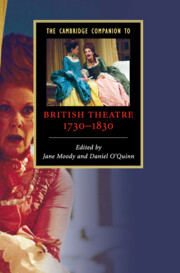16 - Theatre and empire
from Part IV - Places of Performance
Published online by Cambridge University Press: 28 May 2009
Summary
When we put the words empire and theatre together, two key questions emerge: what happened to British theatre as it migrated to Britain's colonies? And how did global domination inflect theatrical production in Britain? At the close of the Seven Years' War, Britain possessed a burgeoning colonial empire in the Atlantic and was emerging as the dominant power in the Asian subcontinent. Bringing these two very different imperial economies into some form of governable structure was exceedingly complex. Soon after the Peace of Paris, the Atlantic empire was in tatters and British imperial attention turned resolutely eastward. The vicissitudes of triumphalism and defeat in the 1760s and 1770s are the crucial backdrop for many orientalist plays; indeed, symptoms of imperial anxiety lasted well into the 1780s. This period is marked by complex scrutiny of the economic instability generated by the East India Company both at home and abroad, and by a remarkable silence on the catastrophic loss of the American colonies. One can hypothesise that the trauma of the American war was handled indirectly through orientalist fantasies but proving such a proposition is beyond the scope of this essay. However, a transition in theatrical representations of the east took place which corresponds to alterations in the governance of colonial affairs and the economics of empire. The complexity of this transition is intimately tied to significant developments in the representation of race, class and the sex/gender system.
The late 1780s and early 1790s witness a fundamental change not only in imperial policy but also in theatrical imperialism. The intense sexualisation of oriental subject matter and the desire to provide ethnographic and topographic information about distant lands undergo changes both in form and in function.
- Type
- Chapter
- Information
- The Cambridge Companion to British Theatre, 1730–1830 , pp. 233 - 246Publisher: Cambridge University PressPrint publication year: 2007
- 1
- Cited by



